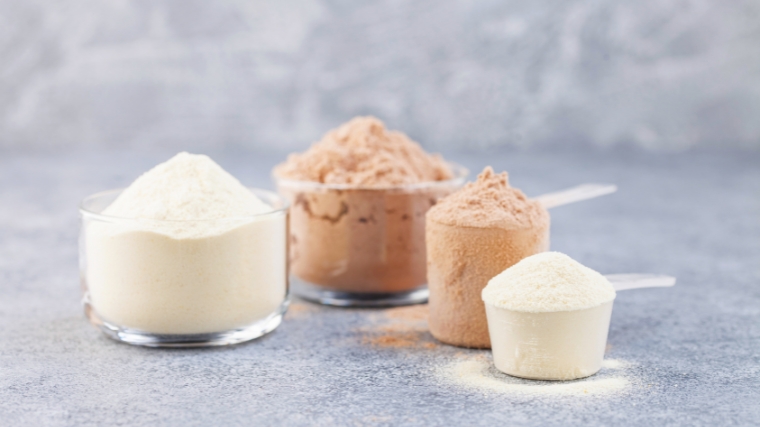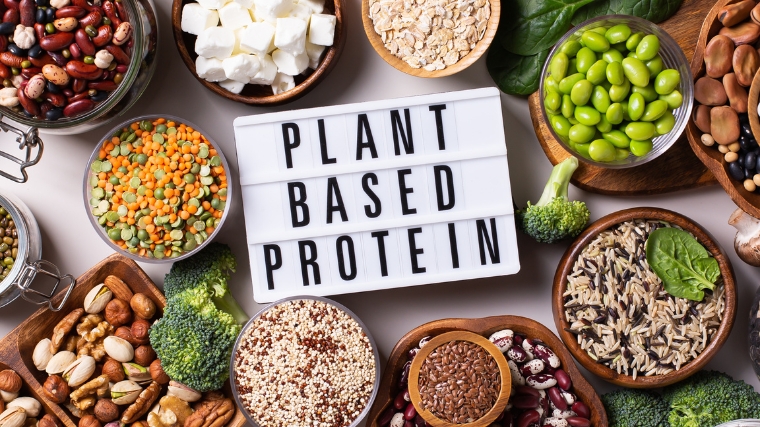[ad_1]
Figuring out the best protein powder for you can be tricky. In addition to personal factors like taste and texture preference, you’ll likely want to know which type of protein powder is best for your fitness goals.
You might be trying to optimize recovery or promote hypertrophy. Whatever you want to accomplish in the gym, ensuring that you get an adequate amount of protein is key. Ideally, you’ll get enough protein in your diet. But if you need high amounts of this muscle-building macronutrient to fuel your gains, protein powder is one of the best supplements for you.

Choosing sides in the battle of whey protein versus plant protein isn’t hard if you’re vegan. After all, whey is dairy while plant protein is vegan. But if you’re looking for performance differences over dietary preferences, read on to find out whether plant protein or whey protein reigns.
Editor’s Note: The content on BarBend is meant to be informative in nature, but it should not be taken as medical advice. When starting a new training regimen and/or diet, it is always a good idea to consult a trusted medical professional. We are not a medical resource. The opinions and articles on this site are not intended for use as diagnosis, prevention, and/or treatment of health problems. They are not substitutes for consulting a qualified medical professional.
What Is Whey Protein?
Whey is a dairy-based protein source that comes from milk. It’s technically highly processed because whey protein is refined until it’s stripped of most non-protein nutritional content. The protein concentrate or isolate that you’re left with contains high protein concentrations by weight. (1)
Typically, whey protein concentrate is about 70 to 80 percent protein by weight, while whey protein isolate has an even higher percentage, coming in at about 90 to 95 percent protein by weight. A serving of whey protein may come in around 25 grams of protein, accompanied by 120 calories, 1.2 grams of fat, and 1.4 grams of carbohydrates. (1)
That means that this kind of protein powder is a very efficient way to hit your target protein intake.
[Read More: The 10 Best Protein Powders for Muscle Gain (2023 Update)]
What Is Plant Protein?
Like whey protein, plant proteins are processed and stripped of their other nutritional components, leaving behind high concentrations of protein. While whey derives from milk, plant protein can come from a variety of vegan protein sources, such as peas, soy, oat, hemp, potato, canola, and fava beans.
Plant-based protein isolates and concentrates — like the kind generally found in vegan protein powders — often contain upwards of 80 percent protein by weight. (2) This allows lifters to get up to 20 to 25 grams of vegan protein per serving. (2)

[Read More: Vegan Diet For Athletes: Can You Build Muscle With Plant-Based Nutrition?]
Don’t automatically assume that plant protein is inferior to animal-based protein in terms of nutritional quality. Like whey protein, pea protein is a complete protein. That means it includes all nine essential amino acids that your body can’t create on its own.
In cases where specific plant proteins don’t have all the essential amino acids on their own, many protein powder brands will combine different sources into blends to ensure that you have everything you need. (3)
How Much Protein Do You Need?
The amount of protein that an athlete needs per day depends on a wide range of factors. These include your age, level of activity, and your goals in the gym.
If you’re aiming to maintain muscle mass during a cut within bodybuilding training, for example, an extra high protein intake might be helpful. And if you’re trying to build muscle with intense CrossFit workouts, protein continues to be a big factor.
Below, you can take advantage of BarBend’s protein intake calculator to ensure that you’re getting enough protein to fulfill your goals.
[Read More: How Much Protein Do You Actually Need Per Day?]
Whey Protein Vs. Plant Protein for Overall Health
To a certain extent, protein is protein. You need it to survive, and you also need it to help you pack on muscle mass. But you might have particular concerns about your body’s ability to process different proteins and their impact on your health beyond muscle growth.
Research suggests that chronic use of whey protein without consulting a medical professional may lead to negative impacts on liver and kidney function, as well as your skin and gut microbiome. (4)
But it’s not all bad news. Limited research suggests that whey protein might contribute to improved insulin response and reduced blood pressure. (5)(6) As such, it may possibly have some helpful impacts on the symptoms of metabolic syndrome and cardiovascular risk factors. (5)(7) However, more research is needed on the subject. (6)
[Read More: How to Eat for CrossFit — A CrossFitter’s Guide to Nutrition]
On the other hand, there seems to be more evidence that plant-based protein reduces markers of cardiovascular disease more effectively than animal-based protein. (8) This effect may be particularly pronounced with soy protein. (9) Plant protein has even been recommended as a substitute for animal protein as one way to help improve cardio-metabolic health. (10)
Still, researchers warn that this evidence doesn’t mean that animal protein is automatically inferior when it comes to cardiovascular health. (11) So you don’t have to chuck out your whey protein just yet.
The Winner
While research doesn’t seem to suggest a downside to plant-based protein for your overall health, there may be limited negative impacts of chronic whey protein supplementation. However, those results were found when it was not used in consultation with medical professionals.
The edge seems to belong to plant protein in this case, but if you’re using whey protein within recommended amounts, it’s not necessarily an inferior choice.
Whey Protein Vs. Plant Protein for Muscle Growth
If you’re trying to figure out how to gain muscle most effectively, you may well be on the search for the right protein powder.
However, you may not be faced with an either-or situation. Plant protein seems to support muscle growth on the same level as animal protein. Research suggests that soy protein and whey protein supplements both support similar increases in lean muscle mass when an athlete accompanies supplementation with resistance training. (12)
[Read More: What You Need to Know About How to Build Muscle]
Another study suggests that supplementing with 19 grams of whey protein and 26 grams of soy protein isolate — both containing two grams of the amino acid leucine — promotes similar levels of muscle growth. (13)
Similarly, supplementing with 30 grams of a corn-, wheat-, and pea-protein blend may yield similar muscle synthesis rates as an equivalent amount of high-quality animal-based protein. (14)
The Winner
Research seems to support the idea that supplementing with plant-based protein can support equivalent muscle-building as whey protein supplementation. In this case, it seems that either supplement will support your goals. This one might come down to personal preference, cost, or whether you’re vegan.
Whey Protein Vs. Plant Protein for Athletic Performance
Which type of protein is going to help you perform better in the gym? Studies suggest that both whey and plant-based protein can be helpful.
Research suggests that vegan protein blends consumed post-workout may positively impact muscle recovery, such that vertical jump and squat performances improve following a previous tough workout. (15) So if you’re stacking back-to-back workouts, vegan protein powder may come to the rescue and help ensure continued levels of high performance.
Whey protein may help cisgender men increase strength for the squat, pull-up, bench press, and overhead press. (16)
[Read More: The Best Barbells for All-Around Training, Weightlifting, Powerlifting, Deadlifts, and More]
Studies have also found that soy protein and whey protein support similar strength increases in both the squat and bench press. (13) During high-intensity training, supplementation with both types of protein may positively impact max strength, force production, and general gym performance. (17)
However, research including young adult athletes of more than one gender has suggested that protein supplementation as a whole might not directly support strength increases. (18)
The Winner
Once again, both plant protein and whey protein may support your performance in the gym. However, if you’re specifically aiming to get stronger, supplementing with protein may not directly help your cause. Still, if it’s supporting overall health, muscle growth, and recovery, you might experience increases in athletic performance as an indirect, positive effect.
Whey Protein Vs. Plant Protein for Recovery
When taken both immediately post-exercise and also the morning after a tough workout, whey protein may improve muscle recovery. (19) Research suggests that keeping your protein levels high with this pattern of supplementation may help stave off next-day decreases in endurance, power, and max strength after intense training. (19)
For maximal potential muscle recovery benefits, it might be more effective to supplement with whey protein after strenuous exercise than before. (20)
But don’t sleep on plant protein. Vegan protein blends have also been found to improve muscle recovery and function over 24 hours. (15)(21)

[Read More: Active Recovery Explained — How to Make Gains While Resting]
The Winner
Protein may not necessarily be the first supplement you might think of when you want to bolster muscle recovery. But it can still be a valuable part of an overall strategy of nutrition for athletes. Supplementing with either type of protein seems like it may help bolster your recovery and get you back into top lifting form.
Your Takeaways
Which protein type takes home the overall win? Check out these key takeaways:
- Whey protein and plant protein powders are both refined and distilled so that they’re stripped of most nutritional content other than protein.
- Whey protein is milk-based, while plant protein can come from a variety of vegan sources, like peas, hemp, and oats.
- Plant protein may be more beneficial to an athlete’s overall health, but whey protein supplementation may also help improve insulin responses and blood pressure reduction. Especially if you’re concerned about liver or kidney function, consider consulting a medical professional along with your whey protein (or any) supplementation.
- In terms of muscle growth, gym performance, and recovery, both plant and whey proteins seem to benefit athletes on similar levels.
If you’re vegan, you’ll, of course, err on the side of plant protein. But otherwise, research suggests that they’ll both get the job done.
More Nutrition Articles
In the debate of whey protein versus plant protein, there doesn’t seem to be a clearly defined winner. And that’s not a bad thing — it simply means that there are a lot of options for strength athletes to boost their gym performance with protein supplements. (Unless you’re vegan. In that case, it’s plant protein for you all the way.)
As you search for yet another potential competitive edge in supplement form, check out these nutrition articles and supplement round-ups from BarBend’s archives.
References
- Banaszek A, Townsend JR, Bender D, Vantrease WC, Marshall AC, Johnson KD. The Effects of Whey vs. Pea Protein on Physical Adaptations Following 8-Weeks of High-Intensity Functional Training (HIFT): A Pilot Study. Sports (Basel). 2019 Jan 4;7(1):12.
- Hertzler SR, Lieblein-Boff JC, Weiler M, Allgeier C. Plant Proteins: Assessing Their Nutritional Quality and Effects on Health and Physical Function. Nutrients. 2020 Nov 30;12(12):3704.
- Gorissen SHM, Crombag JJR, Senden JMG, Waterval WAH, Bierau J, Verdijk LB, van Loon LJC. Protein content and amino acid composition of commercially available plant-based protein isolates. Amino Acids. 2018 Dec;50(12):1685-1695.
- Vasconcelos QDJS, Bachur TPR, Aragão GF. Whey protein supplementation and its potentially adverse effects on health: a systematic review. Appl Physiol Nutr Metab. 2021 Jan;46(1):27-33.
- Pal S, Radavelli-Bagatini S. The effects of whey protein on cardiometabolic risk factors. Obes Rev. 2013 Apr;14(4):324-43.
- Graf S, Egert S, Heer M. Effects of whey protein supplements on metabolism: evidence from human intervention studies. Curr Opin Clin Nutr Metab Care. 2011 Nov;14(6):569-80.
- Wirunsawanya K, Upala S, Jaruvongvanich V, Sanguankeo A. Whey Protein Supplementation Improves Body Composition and Cardiovascular Risk Factors in Overweight and Obese Patients: A Systematic Review and Meta-Analysis. J Am Coll Nutr. 2018 Jan;37(1):60-70.
- Li SS, Blanco Mejia S, Lytvyn L, Stewart SE, Viguiliouk E, Ha V, de Souza RJ, Leiter LA, Kendall CWC, Jenkins DJA, Sievenpiper JL. Effect of Plant Protein on Blood Lipids: A Systematic Review and Meta-Analysis of Randomized Controlled Trials. J Am Heart Assoc. 2017 Dec 20;6(12):e006659.
- Zhao H, Song A, Zheng C, Wang M, Song G. Effects of plant protein and animal protein on lipid profile, body weight and body mass index on patients with hypercholesterolemia: a systematic review and meta-analysis. Acta Diabetol. 2020 Oct;57(10):1169-1180.
- Lin Y, Mouratidou T, Vereecken C, Kersting M, Bolca S, de Moraes AC, Cuenca-García M, Moreno LA, González-Gross M, Valtueña J, Labayen I, Grammatikaki E, Hallstrom L, Leclercq C, Ferrari M, Gottrand F, Beghin L, Manios Y, Ottevaere C, Van Oyen H, Molnar D, Kafatos A, Widhalm K, Gómez-Martinez S, Prieto LE, De Henauw S, Huybrechts I; HELENA study group. Dietary animal and plant protein intakes and their associations with obesity and cardio-metabolic indicators in European adolescents: the HELENA cross-sectional study. Nutr J. 2015 Jan 21;14:10.
- Campbell WW. Animal-based and plant-based protein-rich foods and cardiovascular health: a complex conundrum. Am J Clin Nutr. 2019 Jul 1;110(1):8-9.
- Messina M, Lynch H, Dickinson JM, Reed KE. No Difference Between the Effects of Supplementing With Soy Protein Versus Animal Protein on Gains in Muscle Mass and Strength in Response to Resistance Exercise. Int J Sport Nutr Exerc Metab. 2018 Nov 1;28(6):674-685.
- Lynch HM, Buman MP, Dickinson JM, Ransdell LB, Johnston CS, Wharton CM. No Significant Differences in Muscle Growth and Strength Development When Consuming Soy and Whey Protein Supplements Matched for Leucine Following a 12 Week Resistance Training Program in Men and Women: A Randomized Trial. Int J Environ Res Public Health. 2020 May 29;17(11):3871.
- Pinckaers PJM, Kouw IWK, Gorissen SHM, Houben LHP, Senden JM, Wodzig WKHW, de Groot LCPGM, Verdijk LB, Snijders T, van Loon LJC. The Muscle Protein Synthetic Response to the Ingestion of a Plant-Derived Protein Blend Does Not Differ from an Equivalent Amount of Milk Protein in Healthy Young Males. J Nutr. 2023 Jan 14;152(12):2734-2743.
- Naclerio PhD F, Seijo PhD M, Earnest PhD CP, Puente-Fernández MSc J, Larumbe-Zabala PhD E. Ingesting a Post-Workout Vegan-Protein Multi-Ingredient Expedites Recovery after Resistance Training in Trained Young Males. J Diet Suppl. 2021;18(6):698-713.
- Obradović J, Vukadinović Jurišić M, Rakonjac D. The effects of leucine and whey protein supplementation with eight weeks of resistance training on strength and body composition. J Sports Med Phys Fitness. 2020 Jun;60(6):864-869.
- Banaszek A, Townsend JR, Bender D, Vantrease WC, Marshall AC, Johnson KD. The Effects of Whey vs. Pea Protein on Physical Adaptations Following 8-Weeks of High-Intensity Functional Training (HIFT): A Pilot Study. Sports (Basel). 2019 Jan 4;7(1):12.
- Duarte NM, Cruz AL, Silva DC, Cruz GM. Intake of whey isolate supplement and muscle mass gains in young healthy adults when combined with resistance training: a blinded randomized clinical trial (pilot study). J Sports Med Phys Fitness. 2020 Jan;60(1):75-84.
- West DWD, Abou Sawan S, Mazzulla M, Williamson E, Moore DR. Whey Protein Supplementation Enhances Whole Body Protein Metabolism and Performance Recovery after Resistance Exercise: A Double-Blind Crossover Study. Nutrients. 2017 Jul 11;9(7):735.
- Cockburn E, Stevenson E, Hayes PR, Robson-Ansley P, Howatson G. Effect of milk-based carbohydrate-protein supplement timing on the attenuation of exercise-induced muscle damage. Appl Physiol Nutr Metab. 2010 Jun;35(3):270-7.
- Kerksick CM, Jagim A, Hagele A, Jäger R. Plant Proteins and Exercise: What Role Can Plant Proteins Have in Promoting Adaptations to Exercise? Nutrients. 2021 Jun 7;13(6):1962.
Featured Image: NatalyaBond / Shutterstock
[ad_2]
Source link
Fitnessnacks – #Whey #Protein #Plant #Protein #Similarities #Differences #Benefits
Courtesy : https://barbend.com/whey-protein-vs-plant-protein/
